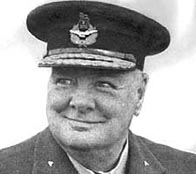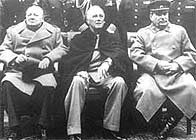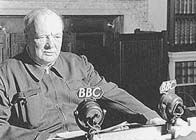 In 2002, BBC conducted a poll called “100 Greatest Britons” to find out who the people of Great Britain thought was the greatest Briton to ever live. The unanimous winner was Sir Winston Churchill.
In 2002, BBC conducted a poll called “100 Greatest Britons” to find out who the people of Great Britain thought was the greatest Briton to ever live. The unanimous winner was Sir Winston Churchill.
For most of us, I mean Americans, we’d probably agree with this result because he was half American. In all seriousness, as a democracy we continue to treasure Churchill’s memory for his unflagging courage in the face of overwhelming odds and for his unfailing belief that democracy will inevitability triumph over tyranny.
And he was, after all, “The British Bulldog” that saved England from Hitler and the Nazi Regime. To us he’s one of the greatest that ever lived across the Atlantic Ocean. Would it be surprising to know that he wasn’t the Prime Minister (PM) when Britain declared war on Germany? Would it surprise you even further to know that only one month after the Allied Forces victory, Churchill was defeated by votes of 2 to 1 in the General Election? He didn’t come back to win it and lead England again until 1951. During the 1930s, Churchill was among the few politicians to voice concern over Germany’s increasing military build-up. This decade is known as Churchill’s wilderness years, a time when Churchill lost his post as Chancellor of the Exchequer, the second-most powerful position in the government, and was ostracized by his party for his continual warnings about the rise of Adolph Hitler and the Nazi party.
What happened during World War II that made him a legend?
Hitler and Nazi Germany were stampeding across Europe and not one Army could stop them. Norway, Poland, Austria, France to name a few were falling. Hitler had his sights across the English Channel and an invasion attempt of Great Britain was imminent.
What did Sir Winston Churchill do?

Churchill, Roosevelt and Stalin attend the Yalta Conference
He accepted the Leadership Role and changed the countries mindset from defensive to offensive
Sir Winston Churchill became Prime Minister on the eve of WWII, leading a country with no significant allies and a limited arsenal into the greatest conflict of the century. He immediately organized an air and naval defense to protect Britain from German invasion and almost simultaneously sent the rest of the British army to fight Mussolini’s growing military forces in the Middle East. It was a bold move, based on Churchill’s conviction that the best way to disrupt Hitler’s plans to invade England was to force him to fight on multiple fronts.
He gave public speeches that inspired a nation. He had an exceptional flair for language and writing.
As brilliant an orator as he was a strategist, Churchill’s speeches  during the outbreak of WWII inspired the public to face whatever fate might befall them with courage. Shortly before the Battle of Britain, the campaign that successfully fought back against Germany’s intention to achieve air superiority over the Royal Air Force, he delivered one of his most famous speeches, which ended with these words:
during the outbreak of WWII inspired the public to face whatever fate might befall them with courage. Shortly before the Battle of Britain, the campaign that successfully fought back against Germany’s intention to achieve air superiority over the Royal Air Force, he delivered one of his most famous speeches, which ended with these words:
“Let us therefore brace ourselves to our duties, and so bear ourselves, that if the British Empire and its Commonwealth last for a thousand years, men will still say, ‘This was their finest hour.'”
While Churchill’s stirring speeches inspired the public to brace themselves for whatever lay ahead, Churchill understood that victory depended on obtaining help from the United States. After the Japanese attack on Pearl Harbor and the United States would enter the war at last, he wrote in his private journal: “So we had won after all.”
The Historian Dr. Geoffrey Best said it best to describe what made him a legend…
The change did not begin to happen until 1940, when the war was nine months old. Even his enemies had recognized that Churchill would have to be brought into the government in the event of war – his military expertise was universally acknowledged, and his criticisms of Chamberlain’s policy of appeasement had after all proved justified – and he had been made First Lord of the Admiralty. In this capacity he was given charge only of the Royal Navy, a position that, after ten years in the political wilderness, he was content to accept.
… the increased unpopularity of Chamberlain … gave Churchill his big chance.
Had the war ended before May 1940 (as some people wanted it to do, although it would have meant sacrificing Poland in the wake of Czechoslovakia), history would now know Churchill as an average First Lord, with an embarrassing share of responsibility for the failures of the Norwegian campaign. But by a strange turn of history, this failure led to the increased unpopularity of Chamberlain, and gave Churchill his big chance. Chamberlain resigned, the man whom most Conservatives wanted in his place (Lord Halifax) declined to serve, and Churchill took on the job.
…It was easy in such circumstances to despair and to look for a way out …
It was astonishing, and a measure of his uniqueness, that he did so with calm assurance and a conviction that this, at last, was the realization of his destiny: to lead his beloved nation in an all-out war for survival and for the universal values it represented.
What most of us don’t know is that he wasn’t a successful politician, but he was a great leader. I think we could take note of this here in the US right about now.
Was he a man without flaws? Absolutely not. He drank and smoked cigars excessively. His early successes in politics were spotty at best. He was eccentric. But when his long life is observed through the lens of hindsight it becomes clearer that the man was exhibiting the slice of his character that made him great: Churchill believed in serving his country before himself or any political party. He exhibited manly traits of courage and led his country when no one else stood with them. He’s certainly up there with history’s other Fearless Men like George Washington and Abraham Lincoln.
Sir Winston Churchill never gave up and he understood that even with flaws, when a man’s convictions are tested is when you find out what he really stands for.
Other Notable Achievements:
- Winston Churchill struggled to meet the requirements of the country’s leading military academy, failing the entrance examination twice before finally passing. A poor student, when he graduated in 1894 he was near the top of his class.
- He escaped from a POW camp in Pretoria, South Africa, during the Second Boer War.
- He was cool under combat, reporting to his mother in a letter that he never felt “the slightest nervousness” on the field of battle.
- Nobel Prize for Literature in 1953
- In April 1953, he was made a Knight of the Garter
- He became an honorary American citizen in 1963 – an honor confirmed by Congress.
- He lived from 1874–1965
“My most brilliant achievement was my ability to be able to persuade my wife to marry me.” -Winston Churchill
Article images from http://www.bbc.co.uk/
Featured image from Robokoboto
Dr. Geoffrey Best excerpt taken from http://www.bbc.co.uk/history/worldwars/wwtwo/churchill_defender_01.shtml
As I read more and more about Churchill, my admiration of the man goes off the charts. In fact, I’ll bet he told his mom that he wasn’t nervous in battle mostly because he wanted to calm her, not because he wasn’t afraid. Churchill always seemed to be thinking about the mood of the nation or the disposition of the people around him. He had a great sense of “other” that many people lack.
Joe, same here. As I was doing research on him is when I learned that he took over the leadership role of fighting Hitler after Chamberlian resigned and Halifax declined. That’s no easy role to jump into. You make an interesting point about his sense of “other”. He definitely exihibited self-less traits.
This is a great article about a great leader.
Churchill reminds me of Rudy Giuliani. Giuliani wasn’t the greatest politician either, and was in sort of a downward spiral before the World Trade Center was hit.
But, when the country was in it’s darkest hour, I remember there was Rudy Guiliani on TV, out on the streets of New York, unafraid, walking toward the World Trade Center and giving encouragement to people as he went along.
Like Churchll, Giuliani rose to the occasion.
Terry, thank you! And thanks for reminding us about Mayor Giuliani. It’s important for us to remember the men who came before us that stepped up in the face of adversity. It encourages us and sets an example to follow.
Wow. What a great leader and a hero – this world needs more people like him.
You’re absolutely right! The world seems to be at a shortage right now. Maybe it’s at an opportune time for someone to step up.
The result only shows how grateful the people of the UK are for what Churchill’d done for the country. A great hero!
It sure does! Prior to writing this article and researching Sir Churchill I hadn’t realized how much he’d done.
Another great post John! I love hearing about these stories of real people. They had struggles and success wasn’t easy, but under all of that were led by conviction and gained more than temporary success, like you mentioned, he became a legend!
Thanks Paul! You hit the nail on the head for why I like writing about them. To show they’re just as human and overcome some of the same obstacles we face.